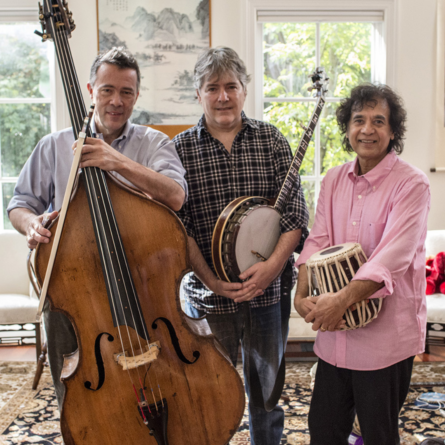As We Speak
The first time banjo legend Béla Fleck, tabla master Zakir Hussain, and double bass virtuoso Edgar Meyer got together to make an album, it was to write, not to play.
When Fleck and Meyer were looking for a third partner for a triple concerto they had been commissioned to write to mark the opening of Nashville’s Schermerhorn Symphony Center, they thought of Hussain, who was quite interested in orchestral writing. “We thought we could learn a whole lot from this guy!” says Béla. The result was The Melody of Rhythm (2009), recorded with the Detroit Symphony Orchestra under Leonard Slatkin.
It wasn’t until the three began touring to promote the album that the trio’s true potential became apparent. Although each had a base in a different musical realm — bluegrass for Fleck, Indian classical music for Hussain, and Western classical music for Meyer — they shared a gift for improvisation as well as an ability to reach across musical genres as casually as neighbors might chat over a backyard fence.” When we are performing on stage, in composing mode or creating mode, we are basically having a conversation,” says Hussain. “So the music emerges as we speak.”
Hence As We Speak, an album that not only showcases the group’s breathtaking abilities as instrumentalists, but underscores the wide range of musical influences at their command. Across a dozen tracks, the group glides easily between the cerebral complexity of Indian rhythm and the gut-level groove of a funky bass line, sounding equally at home with the rigors of raga.
Adding to that magic is Rakesh Chaurasia, who plays bansuri, an Indian bamboo flute. When the trio was touring India, Hussain — who knew Rakesh through his uncle, Indian flute legend Pandit Hariprasad Chaurasia — invited the younger flautist to sit in, and the chemistry was immediately apparent. “I think we wanted to see if we could do something a little more organic with just a small group,” says Meyer. “And to have somebody who plays as beautifully as Rakesh join us really opened it up to a more lyrical and melodic situation.”
“What I think is good about this quartet is that everybody has to stretch in the direction of the other people,” adds Fleck. “To me, a collaboration where nobody changes is not a collaboration. It’s a mashup. And there’s nothing wrong with that. But I like a collaboration where I have to learn a bunch of new things from the other people. And in this case, I’m learning like crazy.”
